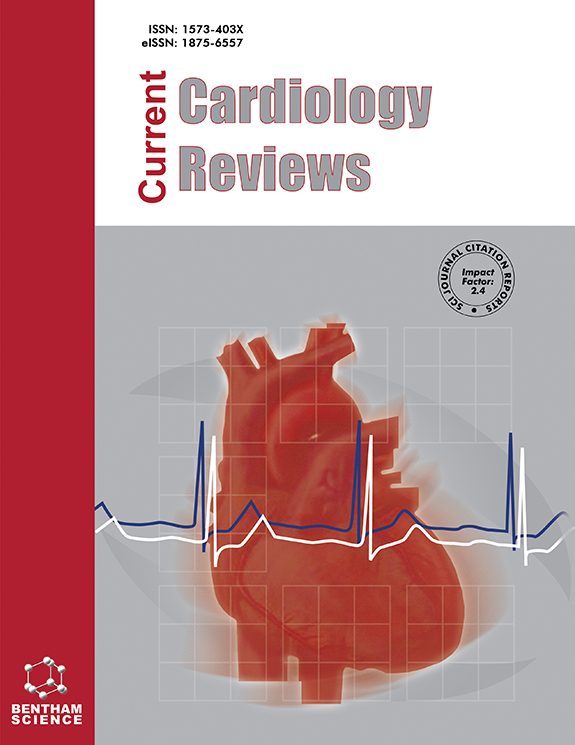
Current Cardiology Reviews
Aims and Scope: Current Cardiology Reviews publishes full-length reviews/mini-reviews and guest edited thematic issues of high quality on all the latest advances on cardiovascular physiology and physiopathology, and on the practical and clinical approach to the diagnosis and treatment of cardiovascular disease, cardiac disease prevention, surgery, and transplantation. All relevant areas are covered by the journal, including arrhythmia, congestive heart failure, cardiomyopathy, congenital heart disease, drugs, methodology, cardiac testing, pacing, medical devices, and preventive cardiology. The journal is essential reading for all researchers and clinicians in cardiology.
Read more...Editor-in-Chiefcasc:
-
Tong Liu Department of Cardiology
Tianjin Institute of Cardiology
Second Hospital of Tianjin Medical University
Tianjin
China
ISSN: 1573-403X (Print)
eISSN: 1875-6557 (Online)
Special Issues With Active Call for Papers
Inflammation, Immunity, and Cardiac Injury
The body responds to various cardiac injuries via complex acute and chronic adaptive processes to maintain pump function. Central to this process is inflammation and immune response. Short-lived inflammation promotes cardiac repair and remodeling post-injury. However, exaggerated inflammation may lead to adverse remodeling following an injury. Therefore, a balance in the degree of inflammation is a vital determinant in promoting endogenous repair. The potent sterile inflammation of the injured heart depends on a multitude of... see more
Advances in Aortic Disease Research and Management
This thematic issue of Current Cardiology Reviews will explore cutting-edge developments in the understanding, diagnosis, and treatment of aortic diseases, with a focus on abdominal aortic aneurysm (AAA) and aortic dissection. Comprising 10-12 articles by leading experts, the issue will cover critical topics such as single-cell RNA sequencing (scRNA-seq) to uncover cellular mechanisms, epidemiological trends, and bioinformatics approaches for data-driven insights. Additional areas include novel imaging techniques, genetic and molecular pathways, immunological factors, and artificial... see more
Artificial Intelligence (AI) in Cardiovascular Disease
Artificial Intelligence (AI) in cardiovascular disease is an emerging interdisciplinary field that integrates advanced technologies to improve patient care. The current AI landscape faces significant challenges, including the complexity of diagnosing and treating these conditions. Recent studies have shown promising results in the use of AI for early detection, diagnosis, and personalized treatment plans, but there are still substantial gaps in the complete understanding and implementation of these technologies. Despite these advances, there is an... see more
Chronic Disease Self-Management for Heart Failure – A Mini Review into Performance Gaps
Chronic disease self-management (CDSM) is a vital component of chronic disease management. There remain several important deficits in this concept. Its benefit are clear, many chronic diseases such as hypertension, diabetes, asthma, rheumatology syndromes have shown benefit in quality of life and quantitative measures of outcomes. Yet, in congestive heart failure early benefits have not translated to current guidelines. This short thematic series on CDSM aims to: firstly provide some understanding on the concept, explore... see more
The Era of Cardiac Medication and Implantable Devices Therapy in Heart Failure Treatment Continues
The heart failure (HF) remains a serious public health problem and affects 64 million people worldwide. Although advances in medical therapy and device assistance have significantly improved HF outcomes, the implications of HF are still dramatic. In recent years, innovative developments have been made in HF treatment management, based on robust evidence from drug treatment trials. Furthermore, cardiac resynchronization therapy (CRT) is the therapy with the most proven effectiveness in HF patients with a reduced... see more
Advances in Managing Cardiogenic Shock and the Value of Percutaneous Mechanical Circulatory Support
Despite the advances in cardiology, the outcomes of patients with cardiogenic shock remain poor. There is an increasing interest and use of mechanical circulatory support for patients with cardiogenic shock. Additionally, the complexity of coronary interventions has increased during the last decade with the potential of treating more high-risk patients who benefit from mechanical circulatory support during the intervention. The scope of this thematic issue is to highlight (1) the pathophysiology of cardiogenic shock and... see more



